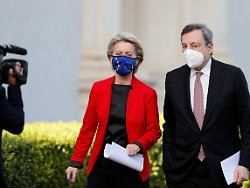Friday, May 21, 2021
High goals at G20 summit in Rome
Corona is said to have been the last pandemic
The corona crisis mercilessly reveals the weaknesses in international cooperation – such as export bans and collapsing supply chains. That should change in the future, the G20 are now deciding at a major summit in Rome. But that is by far not all.
Be better prepared for future health crises: The 20 most important industrialized and emerging countries (G20) agreed at a digital “world health summit” on principles for stronger cooperation in crises such as the corona pandemic. The lesson has been learned in this crisis, said EU Commission President Ursula von der Leyen in the evening in Rome. There should be no more export stops and blocked supply chains like in this pandemic. At the same time, the countries set themselves the goal of preventing future pandemics. Von der Leyen said the corona crisis should have been the last pandemic.
Vaccine manufacturers also assured poorer countries that more than a billion corona vaccine doses would be delivered by the end of the year. The EU wants to promote the construction of production facilities for vaccines in Africa on a large scale and donate at least 100 million corona vaccine doses to the international vaccine program Covax by the end of the year. The G20 states, including Germany, China, the USA and India, agreed in the “Rome Declaration” on 16 principles that promise more cooperation and better distribution of vaccines, for example.
In view of the dispute over patent rights for corona vaccines, the international community has recognized how important these rights are in order to accelerate production, said von der Leyen. According to her, at the beginning of June the EU wants to clarify the use of licenses in times of crisis such as the corona pandemic with a proposal to the World Trade Organization. The debate about the possible revocation of vaccine patents had recently picked up pace after a move by US President Joe Biden. The EU did not support the proposal, Chancellor Angela Merkel declared a clear rejection of the relaxation of patent protection. Von der Leyen now indicated that the EU proposal could be a kind of middle ground and does not exclude compulsory licenses even in exceptional situations.
Early warning system planned
In their declaration, the G20 also advocate a “multilateral trading system” and emphasize the importance of open global supply chains in health emergencies. “That clearly means: no export stop,” said von der Leyen. Bottlenecks in the delivery of sometimes rare components of vaccines should also be a thing of the past. The EU repeatedly emphasizes that, unlike the USA or Great Britain, for example, it exported vaccines to other parts of the world on a large scale during the Corona crisis. According to von der Leyen, the G20 countries also recognize that human influence on nature contributes to pandemics. According to the statement, the states also want to set up an early warning system to exchange information more quickly in the future.
Italy under Prime Minister Mario Draghi currently holds the G20 presidency. The Mediterranean country organized the summit together with the EU Commission. Despite all the optimism about the declaration, UN Secretary General António Guterres warned against considering the corona pandemic defeated too soon. “Now that winter is just around the corner in the global south, I fear the worst is yet to come,” he said at the summit. The UN chief called on the world community to make access to tests and vaccines, among other things, fairer.
Institutional representatives, such as Microsoft co-founder Bill Gates, also pushed for fairer access to vaccines in the face of inequalities. In addition, research and vaccine development must be accelerated. The Bill & Melinda Gates Foundation is committed to improving health care worldwide.
Massive aid for Africa
Several manufacturers of corona vaccines assured poorer countries in video messages that more than a billion vaccine doses would be delivered by the end of the year. Biontech / Pfizer (around one billion cans), Moderna (around 95 million cans) and Johnson & Johnson (around 200 million cans) promised a total of almost 1.3 billion units. Deliveries to developing and emerging countries are to begin in the second half of the year. More than a billion doses are also expected to be made available in 2022. The poorest countries should therefore only have to pay the production costs, while a “low-cost price” should apply to developing countries.
The EU also wants to finance the construction of sites for vaccine production in Africa with one billion euros. According to von der Leyen, the so-called hubs are to be built across the continent. Where exactly, she left open. In the event of a possible health crisis in the future, vaccines could then be produced at the sites. African countries would have faster access to protect their populations.
According to von der Leyen, the EU and its member states also want to donate at least 100 million Corona vaccine doses to the Covax international vaccination program and developing and emerging countries by the end of the year. Chancellor Angela Merkel said in the evening in Berlin that Germany wanted to give 30 million Corona vaccination doses.
.
